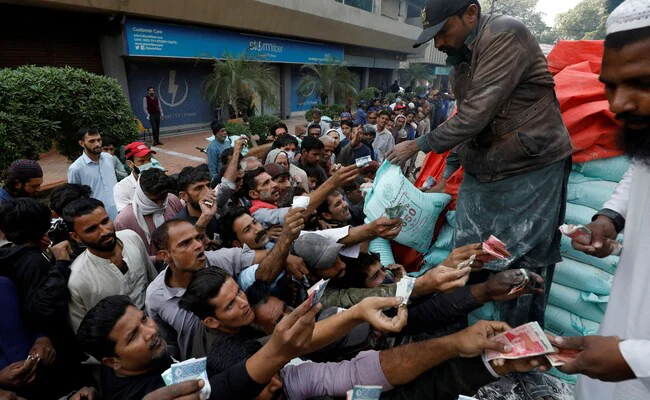Pakistan enterprise chiefs are clamouring for the cash-strapped authorities to permit production substances caught at the important thing port of Karachi into the country, caution that a failure to boost a ban on imports will depart tens of thousands and thousands jobless. Faced with seriously low US-greenback reserves, the authorities has banned all however critical meals and medicinal drug imports till a lifeline bailout is agreed with the International Monetary Fund (IMF).
Industries consisting of metallic, textiles and prescription drugs are slightly functioning, forcing hundreds of factories to shut and deepening unemployment. The metallic enterprise has warned of excessive supply-chain troubles as a result of a scarcity of scrap metal, that is melted down and changed into metallic bars. In the beyond few weeks, the bars have reached document prices.
“We at once feed substances to the development enterprise that is connected to a few forty five downstream industries,” stated Wajid Bukhari, head of Pakistan`s Large Scale Steel Producers Association.
“This entire cycle goes to be jammed.”
Smaller factories have already close after arduous stocks, at the same time as a few large flowers are simply days from closing, he stated. With an import invoice of round $a hundred and fifty million a month, the metallic enterprise says its operations at once and in a roundabout way have an effect on numerous million jobs. Latest information from the principal financial institution stated forex reserves had plunged to simply $2.nine billion — sufficient for much less than 3 weeks of imports.
“This scenario triggers fears the development enterprise will near down very soon, plunging hundreds of labourers into unemployment,” the Constructors Association of Pakistan stated, echoing requires metallic and equipment to be exempted from the import ban.
‘Grinding Halt’
Years of monetary mismanagement and political instability have broken Pakistan’s financial system — exacerbated via way of means of a worldwide strength disaster and devastating floods that submerged a 3rd of the country. Alongside a scarcity of uncooked substances, hovering inflation, growing gasoline charges and a plummeting rupee have battered production industries. An IMF delegation left Pakistan on Friday after pressing talks to restore a stalled mortgage programme ended and not using a deal, leaving lingering uncertainty for enterprise leaders.
The fabric and garment enterprise is accountable for round 60 percentage of Pakistan’s exports and employs approximately 35 million people, processing gadgets consisting of towels, undies and linen for most important manufacturers throughout the world. “The fabric enterprise must be prioritised,” stated Shahid Sattar, secretary wellknown of the All Pakistan Textile Association. “We are the mainstay of the country’s exports,” he instructed AFP.
“If you do not have exports, how can you shore up your forex reserves? Then consequently, how will the financial system recover?” After floods devastated home cotton vegetation final summer time season the world is uploading a huge quantity of uncooked fabric. Factory proprietors appealed to the finance minister final month for “direct intervention” to unjam the backlog, which additionally impacts dyes, buttons and zippers.
“The fabric enterprise has greater or much less come to a grinding halt in Pakistan. We do not have uncooked substances to function our generators,” Sattar stated. Around 30 according to cent of the fabric generators have close down operations completely, at the same time as the relaxation are running at much less than forty according to cent capacity. Tauqeer ul Haq, the top of the Pakistan Pharmaceutical Manufacturers Association, stated forty medicinal drug factories had been getting ready to closure due to a loss of key ingredients.
Fuelling Poverty
Pakistani economist Kaiser Bengali stated the supply-chain disaster was “feeding inflation and additionally hitting the authorities’s revenues”. It is likewise escalating unemployment and fuelling poverty, with a massive percentage of creation and manufacturing unit people in Pakistan paid daily. “On common at some stage in normal manufacturing, people are paid for round 25 days (according to month) however now they’re getting wages for 10 to fifteen days. While a few groups have even suspended their manufacturing and people will simplest receives a commission as soon as production resumes,” Bengali instructed AFP.
Nasir Iqbal, an economist on the Pakistan Institute of Development Economics, stated export bans just like the one presently in place “can in no way be a sustainable solution”. Under-stress Finance Minister Ishaq Dar final week stated corporations must “permit the cash are available in from the IMF” earlier than letters of credit score could resume for imports, finishing the logjam.
Meeting the situations of the bailout, consisting of via way of means of elevating petrol and strength charges, is likewise predicted to boom inflation, however must pave the manner for in addition monetary aid from pleasant nations.
In the vintage Silk Road metropolis of Peshawar, factories generating the whole thing from glass to rubber and chemicals, generally for the neighbouring Afghan market, have closed one after the alternative withinside the beyond numerous months.
“Around six hundred have closed, at the same time as many are working at 1/2 of capacity,” stated Malik Imran Ishaq, the president of the Industrialist Association Peshawar, which represents 2,500 factories. “The complete enterprise network is in critical trouble.”

